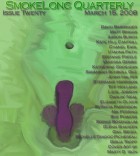The need to stray is strong in this girl. Does the ending satisfy her need in some way?
I don’t know if it’s a need to stray or ambivalence that is strong in this girl. She seems to have fallen into her identity as a cadet. It suits her, but she’s there because of circumstance— the Captain calling, etc. I do think the end works. Who knows where she will end up next? She doesn’t but she’s okay with that.
I like the image of the girls camo-sticking each other. It gives the scene an unreal feel, which makes me wonder how “real” training for war actually feels, and yet I can only surmise…
You’d be surprised just how real it is! There’s something about being out at an abandoned armory(knowing there are still “dud” shells there— maybe even live ones), dressing like a soldier, carrying a weapon. When the shooting starts it seems very “real” which is why, despite herself, she fires the weapon.
Sometimes I think the first-person point of view is a natural fit for flash fiction. What point of view do you use most often in your flash work? Why?
I usually use first person in all my work. This is partially because a lot of my writing begins as true autobiography— but usually diverges at some point. I know a lot of “characters” and I like to employ them. Also, regardless of whether the character is at all autobiographical, I like to “hear” the character speak and I find first person most conducive to that approach.
Tell us about your chapbook, Bone in a Tin Funnel. It’s poetry, correct?
Bone in a Tin Funnel is composed of poems dealing with Meniere’s disease, an ideopathic, progressive and incurable inner ear condition. It causes tinnitus and hearing loss as well as vertigo and nausea. I have Meniere’s disease, and bad episodes would really lay me out. I’d just lie there in bed, unable to move, waiting for the spinning to stop, analyzing the noises in my ear. The ringing would change tones depending on just how close I was to real dizziness (or with the weather, etc.) The poems started as little sketches of the different sounds. One day it sounded for all the world like a bone rattling around in a tin funnel.
While reading through the annual Kathy Fish Fellowship applications, I was struck by the number of writers who were using flash as, to paraphrase, a means to an end. Most people weren’t writing flash because they loved the form, because it took them places other types of fiction didn’t. Instead, they were using it as a gateway into longer works—short stories, short story collections, novels. As a champion of flash, I found this discouraging. Is flash fiction less satisfying, in terms of either writing or reading, than longer works? Or is it that the markets still haven’t accepted flash as a legitimate form? Why do you write flash, and where do you see it taking you?
I usually intend my flashes to be flashes. I started out writing poetry, and writing flash is a great deal like writing poetry. For me, a poem or a flash usually comes to me in a whole and complete form before I actually “write” it on paper. I do exercises which employ word groups which often determine the direction of the piece. Generally, poems and flashes are “revealed” to me, I don’t intend to write something specific. When I write essays or short stories, I tend to do more to inflict my will upon the writing. Personally, I find flash extremely satisfying. A lot of times my initial readers will tell me they want more, want a flash expanded. That response is very flattering—it tells me the piece works and has piqued the reader’s interest, but in a piece intended as flash it can also be a frustrating response. Sometimes a flash will evolve into a series of flashes or a short story, but that’s not usually my intent.



 The core workshop of SmokeLong Fitness is all in writing, so you can take part from anywhere at anytime. We are excited about creating a supportive, consistent and structured environment for flash writers to work on their craft in a community. We are thrilled and proud to say that our workshop participants have won, placed, or been listed in every major flash competition. Community works.
The core workshop of SmokeLong Fitness is all in writing, so you can take part from anywhere at anytime. We are excited about creating a supportive, consistent and structured environment for flash writers to work on their craft in a community. We are thrilled and proud to say that our workshop participants have won, placed, or been listed in every major flash competition. Community works.